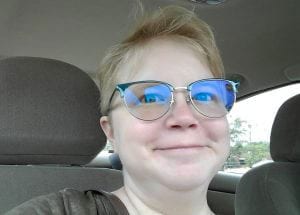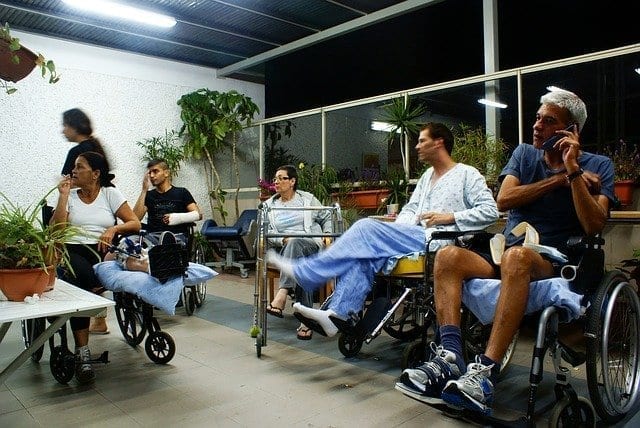Since April 2019, I have been actively seeking out adults (18+) who are willing to publicly share their stories about their lives with rare and chronic diseases. I feel it is essential that the rare community include and listen to those adults living with the illnesses; otherwise legislation for rare community, social structure in rare communities, and the general public knowledge of living rare and chronic will not gain any traction in the future of medicine.
Recently, I spoke with a beautiful adult woman named Kara. She has lived with acromegaly for the last 23 years of her adult life. Acromegaly is different for every person diagnosed. For Kara, she had a couple precursor diagnoses (polycystic ovarian syndrome and insulin resistance) before she found doctors and specialists who would take the time to diagnose and treat her acromegaly and small fiber neuropathy.
Kara has a bachelor of arts degree in graphic design. She currently lives in greater New York City with her husband and is active in the arts and advocating to have her life with rare disease validated. She uses #AcromegalyLife and #DisabledArtist on her social media accounts to bring awareness for others to understand what living rare and chronic can look like.
I was struck by our conversation on the phone when Kara related that adults living with rare and chronic conditions tell their story so much in the medical world that it has become exhausting to relay it over and over again in the community support groups. She continued to explain by saying adults have often lived either their childhood and teen years or both repeating their symptoms and diagnosis information. With this background, adults would rather have conversations about the issues affecting them instead of repeating the logistics of what parents, medical providers, caregivers, and advocates have been saying about them for years.
I decided to ask her questions about some issues that need to be heard by the world from the mouths of the adults living with the disease themselves instead of the caregivers.
- When we spoke on the phone a few days ago, you mentioned “I’m tired of telling my story; I want to have a conversation.” I thought this succinctly and adequately revealed what adults living with any kind of chronic and rare disease feel like, especially if they have been dealing with illness since birth or later teen and college-aged years. Could you tell me more about the conversation that needs to happen in the rare community and in the general public (i.e. the phrases heard by many adults “But you don’t look sick” and “do you work”?)
Kara: In the early stages of my chronic illness, self doubt crept in. I did not feel confident that I was still creative. That I was still a graphic designer who had a talent and could work with others. I hurt – chronic daily migraines and neck and arm pain shut down thought processes and creative flow. Eventually, I got over it. If I can get over it so should the community at large: I got over my doubt and did not lose my creativity or ability to do the work. If I can get over my insecurity, then employers should be able to get over the fact that I have an illness. I am still creative and professional. They have to get past the “sick” part and offer options to be inclusive.
Not everyone with acromegaly becomes so damaged. I feel like I am made of broken popsicle sticks held together with duct tape. My husband hates this phrase but it has been my truth for a very long time. It is also a very vivid description of what I feel and it helps people understand.
But what about last month? The weather was crisp and clear, my head was my manageable seven out of 10 on the pain scale (yes, every doctor realizes that it is absurd that I learn to function at a constant seven) so on this Tuesday I can paint a flower or two. I can make it into a pattern, put it on mugs, home decor or sell it out right. But people don’t see me. I need to be acknowledged for my talent and my disability.
- You were quite vulnerable and honest about your life as an adult with an advanced degree who wants to work but is hindered by symptoms and side effects of ongoing illness. You mentioned feelings of being stuck between “I don’t feel well enough” and “I can start but can I finish?” Could you describe how these feelings and physical barriers in acromegaly dictate your life in paid and unpaid jobs?
Kara: A year ago a dear family friend was opening a gym on a shoestring budget. Remember I am valuable, I am talented and I am worthy, but my schedule is wonky due to health. It is my choice to give him my talents and in turn he sends me a little bonus thank you now and again. It covers a blowout (it’s too painful to do my own hair) or a massage or a new pair of pajamas. I live in pajamas or (to be politically correct) loungewear.
I have a few of these friends that are close to my heart; they deserve professional design to represent their business and I get to be creative.
Creating, be it graphic design, oil painting, or watercolor, soothes my weary soul. It is therapy.
I have one “real” client. A summer youth program. The youth program hits all the markers: a fresh design, kid oriented (my favorite), and a short and flexible time frame. They get a sweet deal and my soul gets refreshed.
I want to work but I cannot commit. Why? Because yesterday I was able to walk and today I am unable to hold my head up. I don’t know if this will last a day or weeks.
Who would hire me? I would need to work from home. I would need my hours to be random and flexible. As long as I can make the deadline, why should they care? But they do.
The youth program is run by two people. The head of the program knows my honest truth and I appreciate him. He is kind, compassionate, respectful and, easy to work for.
I want to be heard, seen, and respected because of my abilities and my disabilities.
What if social security disability had a program that acknowledged my education and valued my talent? What if companies registered with the program and had deadlines but planned ahead, budgeting in extra time so that I may fulfill their needs? What if they were willing to hire designers for a fair wage, on a per project basis that didn’t affect government disability? Because let’s be honest, a project or two does not make a salary and it does not better my financial situation. But that money does pay for a massage a week or a personal trainer, and I need to be watched because of structural damage. Not to mention I could go back to pilates!
Sidenote: pills do not fix me. If insurance paid for pilates, rolfing, and massage, I could have a better quality of life, but it doesn’t, so I’m always stuck. Doctors are constantly telling me to do these things… where is the money coming from?! I’m allowed to have a hobby but it doesn’t pay for a massage a week. It’s random at best.
What if I bought all the never covered supplements doctors recommend but I cannot afford each month? What if doing a project to earn the money for these life-changing things wasn’t held against me and threatened my social security disability?
Might I have a better quality of life? Don’t I deserve that? Don’t we all? But none of that exists. I feel cheated. I wish my body worked. I wish I could have a regularly paying job.
I fake being well… When I can. If I can’t, I’m on the couch or desperate to get there. Sometimes my voice betrays me – no matter what I try.
I’d still like to be offered meaningful projects that fit my abilities as an educated, talented individual. This would work for so many of us with degrees — just looking for a few projects here and there.
Why is it one or the other? Why are you penalized if you are sick? Why are we dismissed? Isn’t being chronically ill punishment enough? Yet everything else is taken away and it doesn’t have to be.
The rare disease and invisible illness communities needs to join as one. Not just each disease in its own bubble. We have similar if not the same experiences.
We, the disabled, the largest minority in the US, need to band together. We check off all the boxes: sex, race, religion, economic status… But there is no bridge. There is no support. Why can’t we change this?
I can’t volunteer in real life. I can’t commit to Thursday at 4 PM every week. Who knows how I’m going to feel from day to day if not hour to hour?
Being in a government program means being subjected to one size fits all solution. When in life does one size fit all?
I miss real life encounters. They are hard and exhausting but filled my soul for a bit. I’ll take it but it’s rarely an option offered me. I wish I had the energy to start something, but I don’t. I like to contribute and be a part of society.
I know we deserve better and I know it is possible. The fact that it is possible but no one with authority and ability ever bothers to try leaves me trapped. No one wants to be trapped, yet I am in so many ways.
Although all these negative things are my truth, I try not to dwell. The other part of my truth is that I look for the joy in life and hold on to hope. It’s better than the alternative.
 About the Author: Rebekah Palmer is the author of two books published by Aneko Press: A Letter to my Friend and A Letter to Myself. They are both available on Amazon as well. She also has poetry included in the anthology Strength: Lives Touched By Cystinosis. Please visit her author profile on Goodreads and her author page on Facebook called Jairus Daughter to ask any questions or to reach out.
About the Author: Rebekah Palmer is the author of two books published by Aneko Press: A Letter to my Friend and A Letter to Myself. They are both available on Amazon as well. She also has poetry included in the anthology Strength: Lives Touched By Cystinosis. Please visit her author profile on Goodreads and her author page on Facebook called Jairus Daughter to ask any questions or to reach out.






